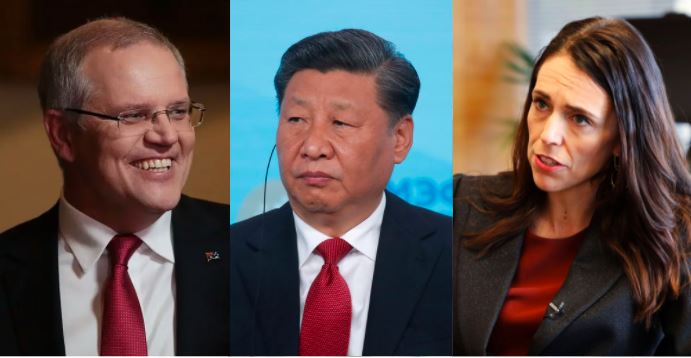In what can be called a radical shift in New Zealand’s China policy, the country’s foreign minister Nanaia Mahuta recently urged the China-bound exporters to look beyond China and diversify their export markets. Mahuta’s comments come in the backdrop of mounting pressure on New Zealand to openly call out China’s treatment of Uyghur Muslims as “Genocide” and to act co-operatively with fellow Five Eyes members to hold China accountable for its blatant violation of international norms.
In an interview with the Guardian, Mahuta appeared to fret about Australia’s year-long economic tussle against China and expected the “storm” to engulf neighbouring New Zealand in no time. “We cannot ignore, obviously, what’s happening in Australia with their relationship with China. And if they are close to an eye of the storm or in the eye of the storm, we’ve got to legitimately ask ourselves – it may only be a matter of time before the storm gets closer to us,” she said.
Mahuta signalled that her country could soon follow Australia’s suit in dealing with China’s abundant economic influence over the Kiwis. The radical change can unquestionably be attributed to Scott Morison’s resilient approach towards the paper dragon. The same New Zealand, not so long ago, asked Australia to “show some respect” and “act more diplomatically” towards China. However, Kiwis faced strong pushback against their unwarranted suggestions to the Morrison administration.
A day after New Zealand’s absurd insinuation, Australian trade minister, Dan Tehan, took no time in showing Kiwis their place and made it clear that Australia’s relationship with China was “based on an assessment of our national interests” and that his government’s approach to trade policy with China would be guided by “proactivity, principle and patience.” The Trans-Tasman diplomatic spat over handling their ties with China grew more worrisome in the coming days.
The Jacinda Ardern administration categorically denied labelling Chinese activities in the Xinjiang region as “genocide”, the term widely used by western countries to condemn Chinese treatment of Uyghur Muslims. The country’s ruling party agreed to pass an anti-China motion condemning China’s activities in Xinjiang only after the “genocide” word was replaced with much toned down “Human rights abuses”. Jacinda Ardern’s administration, once again, left Wellington out of step with its more forthright Western allies.
New Zealand, undoubtedly, has been the weakest link among the Five Eyes alliance, given the country’s over-dependence on the Chinese economy and trade. Trade to China accounts for 28% of New Zealand’s overall exports. Chinese tourists spend nearly $1.7 billion annually in the country. International education is a $5bn industry for New Zealand, and Chinese students make up about 47% of international students in New Zealand’s universities. The same over-dependence is what is stopping the Jacinda Ardern administration to openly call out Chinese belligerence, making the country the least trusted ally in the group of Five Eyes.
The story was no different in Australia till the last year, However, Scott Morrison successfully steered Australia out of the mess carefully knitted by Beijing over the past years. It has been over a year since the Australia-China tariff war broke out last year. This was meant to be a jittering punishment for the Scott Morison government; it has been an enticing one, however. The Chinese hostility provided Australia with an opportunity to diversify the supply chains and eventually cut down the economic dependency on the paper dragon.
The Jacinda Ardern administration has realised that its meek China policy cannot run forever. It has to stop beating around the bush and deal with the ‘China problem’ with tough hands. Once a Chinese poodle, New Zealand now seems to address the Elephant in the room. This is, indeed, Scott Morrison’s triumph over China. The country once proposing the idea of mediation between China and Australia, at China’s behest, is openly declaring to go hard on China. Morrison’s policies are not only proving to be a severe headache for the CCP but are also forcing countries like New Zealand to mend their ways and do the needful.
